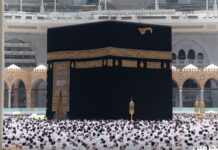By Haroon Ishola Balogun
Apart from the inner feeling of satisfaction of carrying out the ordinance of Allah that you get when breaking your fast, you also feel happy that you are legible for the blissful abode prepared by Allah as reward for those who carries out His orders.
The joyful feeling of long night prayer, the spiritual contentment, the joy of exchanging gifts to your brothers, to the needy, to the poor and putting smiles on their faces radiate your inner self and become new.
The whole exercise is geared towards gaining God’s consciousness. (taqwa),
We read from one of the authentic Hadith of a dream reported by one of the companions to the Prophet on two friends who accepted Islam the same day, practiced good deeds and even one died as a martayred in the battlefield. The other lived a year longer and observed Ramadan. The narrator of the dream reported that he saw the one who died later was given the honour to enter Paradise first before the the one who was martyred. The prophet (PBUH) said it was as a result of fact that the one who died later and enter Paradise first had the opportunity of witnessing another Ramadan and observed it diligently.
Read Also: Ramadan 04: Get closer to Allah with Tahajjud
Because of these and many more blessings, It is reported in some narrations that the companions of the prophet (s.a.w.) used to pray for longevity of their lives six months before Ramadan in order to witness Ramadan and to reap the benefits in it. Immediately after the month, they also beseech Allah to accept their ibadaah for six months. These highlight the extremely high value of the rewards and blessings of this month.
Abu Hurayrah (may Allah be pleased with him) who said: The Messenger of Allah (s.a.w) said: “There has come to you Ramadan, a blessed month which Allah has enjoined you to fast, during which the gates of heaven are opened and the gates of Hell are closed, and the rebellious devils are chained up. In it there is a night which is better than a thousand months, and whoever is deprived of its goodness is indeed deprived.” Narrated by al-Nasaa’i, 2106; Ahmad, 8769. classed as saheeh.






















